Applause and cheers filled a Tel Aviv square as Gaza militants released four Israeli hostages, followed by celebrations in the occupied West Bank when Israel freed 200 Palestinian prisoners in exchange.
While Israel and militant group Hamas completed their second hostage-prisoner swap under a ceasefire deal aimed at paving the way for a permanent end to their war, a last-minute dispute meant Israel blocked the expected return of hundreds of thousands of displaced Palestinians to Gaza's devastated north.
The four hostages released, all female soldiers, reached a hospital on the outskirts of Tel Aviv after more than 15 months of captivity in Gaza.
Israel's prison service confirmed that 200 Palestinian prisoners were freed in exchange, with some of them subsequently deported.
The Israeli captives, Karina Ariev, Daniella Gilboa and Naama Levy, all aged 20, and Liri Albag, 19, waved, smiled, and gave thumbs up as they were paraded on a stage in Gaza city, flanked by militants.
After their handover to the International Committee of the Red Cross, the military said the women were brought to Israel and "reunited with their parents".
In Tel Aviv, where a crowd gathered to watch their release on a large TV screen at a plaza known as Hostage Square, there were tears of joy, applause and a loud cheer as Israeli flags waved.
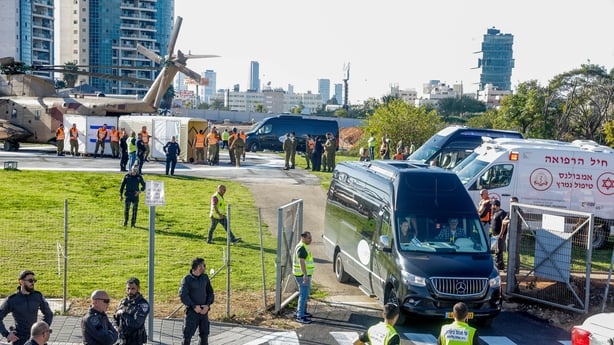
In Ramallah, seat of the Palestinian Authority in the occupied West Bank, crowds of Palestinians erupted in joy as dozens of freed prisoners arrived on buses from jail.
One of them, Azzam al-Shallalta, dropped to his knees and wept at his mother's feet after the teary-eyed crowd carried him on their shoulders, an AFP journalist reported.
"My situation was heartbreaking, truly heartbreaking. We pray to God to free all our brothers we've left behind," Mr Shallalta said, still wearing his grey prison tracksuit.
'Relief'
The freed Israeli hostages were taken by military helicopter to the Rabin Medical Centre, whose deputy director Lena Feldman Koren said the four were in a "stable" condition even though "the prolonged captivity in harsh conditions is evident".
Footage released by the military showed the families overcome with joy at being back together.
Ms Albag and her parents were seen screaming with happiness and laughing while her father lifted her off the ground in a bear hug.
Prime Minister Benjamin Netanyahu spoke with Ms Albag's parents after her release, telling them that "this is a very happy moment that we have been waiting for a long time", according to a statement from his office.
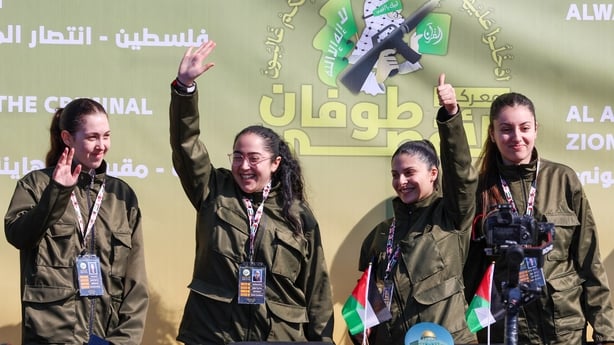
Bulgaria's foreign ministry welcomed with "great relief" the release of Gilboa, who is a dual national.
The United States, which had helped secure the truce deal, said it "will continue with its great partner Israel to push for the release of all remaining hostages".
Israelis rallied in Tel Aviv to call on their government to ensure all hostages, including those not due for release during the first phase of the truce, return home.
"We will do everything, we will fight until the end," said Ifat Kalderon, whose cousin Ofer Kalderon is held in Gaza.
State-linked Egyptian media said 70 freed Palestinian prisoners "deported" by Israel had arrived in Egypt by bus. They were then to travel on into exile in third countries.
Those expelled have been serving sentences for deadly attacks on Israelis, according to a list made public by Israeli authorities.
In the southern Gaza city of Rafah, a crowd gathered to welcome 14 prisoners released by Israel and sent to the territory.
Majda Balousha said she had hoped her husband would return to a "prosperous and not destroyed" Gaza.
"But praise be to God who liberated him," she said.
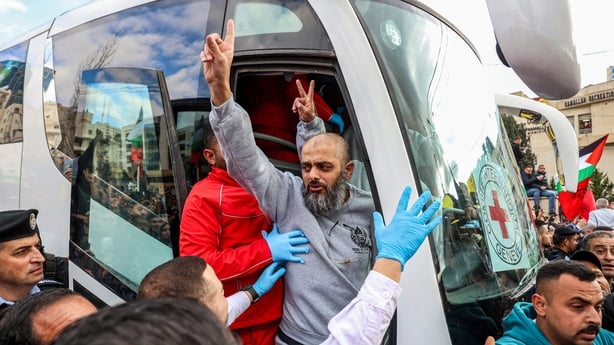
The hostage-prisoner exchange is part of a fragile ceasefire agreement between Israel and Hamas that took effect last Sunday.
Hundreds of truckloads of aid have entered Gaza daily since then, but the UN said "the humanitarian situation remains dire".
It comes as Israel's UN ambassador demanded that the United Nations agency for Palestinian refugees, Gaza's main aid agency, end all operations in Israel by Thursday in line with legislation passed by Israel's parliament.
UNRWA chief Philippe Lazzarini said earlier this month that the agency plans to "stay and deliver" services in areas where it can operate.
But having "no bureaucratic or operational relation," with Israel "makes your operational environment even more challenging," he said.
'We miss home'
Israel announced that it would block the return of Palestinians displaced from northern Gaza until female civilian hostage Arbel Yehud is released.
Mr Netanyahu's office claimed she "was supposed to be released today", but a Hamas source told AFP Ms Yehud will be "released as part of the third swap set for next Saturday".
Palestinian police prevented hundreds of displaced people from reaching the Israeli-controlled passage to the north, where Israeli tanks and armoured vehicles were blocking the road.
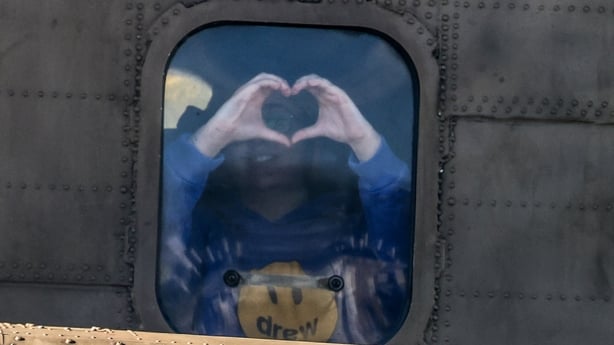
Rafiqa Subh, waiting to return to Beit Lahia, said: "We want to go back, even though our houses are destroyed. We miss our homes so much."
The ceasefire agreement should be implemented in three phases. The last two have not yet been finalised.
The deal's second phase is to see negotiations for a lasting end to the war, but analysts have warned it risks collapsing because of the deal's multi-phase nature and deep distrust between Israel and Hamas.
During the first, six-week phase, 33 hostages should be freed in staggered releases in exchange for around 1,900 Palestinians held in Israeli jails.
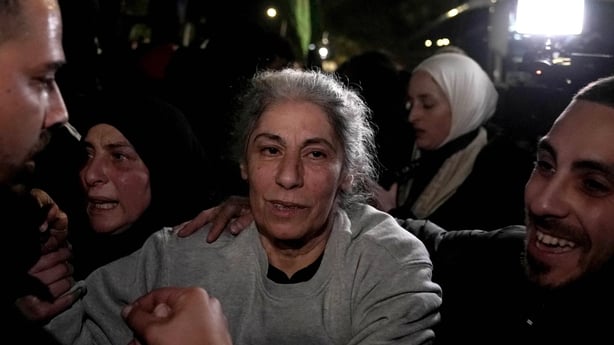
Militants released three hostages on the first day of the truce in exchange for 90 Palestinians.
During Hamas' 7 October 2023 attack, militants took 251 hostages, 87 of whom remain in Gaza, including 34 the Israeli military claims are dead.
The attack resulted in the deaths of 1,210 people, mostly civilians, according to an AFP tally based on Israeli official figures.
Israel's retaliatory war in Gaza has killed at least 47,283 people, the majority civilians, according to figures from the territory's health ministry which the United Nations considers reliable.

